Different Meanings of Fishery and Differences between Fishery and Fisheries
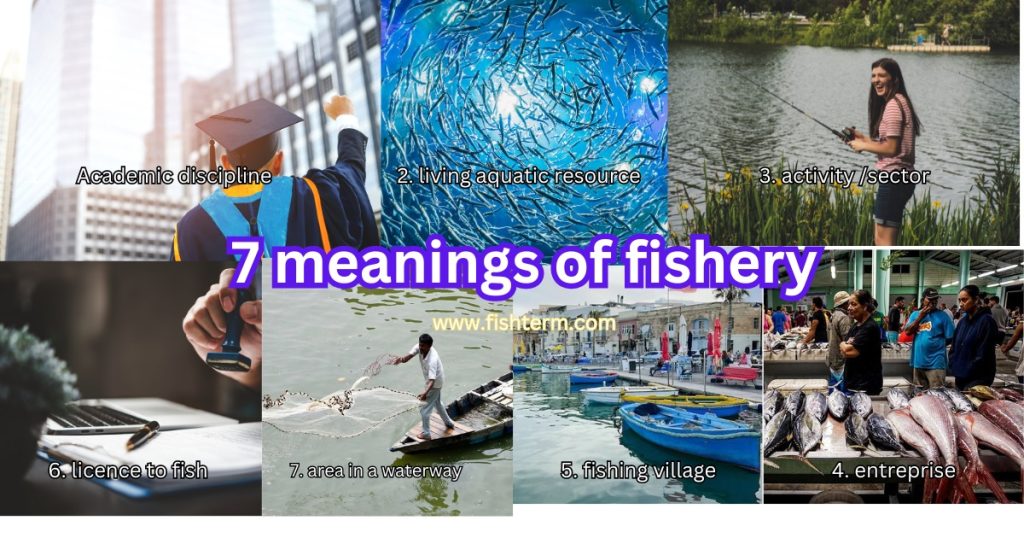
Nowadays, the term ‘fishery’ can mean an activity, a place, aquatic organisms, a licence, an enterprise, or even a discipline. Both fishery and fisheries do mean the same when talking of the activity and are often used interchangeably by many renowned organisations such as the FAO, COMHAFAT, some regional fisheries commissions, venerated authors, etc. to mean the activity. Regarding choosing either fishery to fisheries or vice versa, consult your audience’s international fisheries commission.
7 Different Meanings of Fishery in Context
Except you are a keen reader and expert in fisheries, you may find it difficult to understand exactly what a writer is trying to say especially when a writer uses either term repeatedly in a single sentence or paragraph without clearly bringing out the context. Let us consider the excerpt below:
‘I hold a fishery1 and I was taught how to access, evaluate and manage a fishery 2. As a young graduate, I intend investing in fishery3, by cooperating with a nearby fishery4 around our district’s fishery5. Since I do not own a fishery4 yet, I will apply to the government for a fishery6 to creat and operate my new company while visiting the Niger river’s major fishery7 in the meanwhile. ‘
The above excerpt can be complex for non-experts but it is not grammatically wrong though – just very polysemous. I am going to explain what the writer meant in this ambiguous excerpt. The term was used to refer to 7 completely different concepts of the term “fishery”, denoted by the superscript notation on each usage.
These 7 meanings/concepts of fishery (or fisheries) as used in the excerpt above are:
- Academic discipline;
- The aquatic organisms in the water;
- Activity/sector;
- A company or fish industry;
- A place, often in the district or outskirts dedicated to fishery activities
- A licence to operate in the fishery sector;
- An area in a waterway (stream, river, etc.) has fishery resources (aquatic organisms).
Now let us detailly examine these meanings in the following section.
1. Fishery: academic discipline
This is the academic discipline that studies the culture, harvest, and processing of edible living aquatic resources like finfish, shellfish, aquatic mollusks, etc. It is often referred to as fisheries science in most universities. Undertaking a bachelor’s or master’s programme in this discipline will often earn you a bachelor’s of science or master’s of science in fisheries. Studying the technical aspects of fishery in most higher institutions will lead to the issue of an engineering degree like a Bachelor’s or Master’s of Engineering in Fishery Science.

For universities offering fisheries programmes, visit:
Higher institutions offering fisheries studies in the world
2. Fishery: a group of living aquatic resources
This refers to the sum of all the edible living aquatic resources in their various species located in a water body at a given time. This stock is usually assessed during fishery management. We easily come across collocations like the river’s fishery, the lake’s fishery, fishery stock, fishery resources, etc.
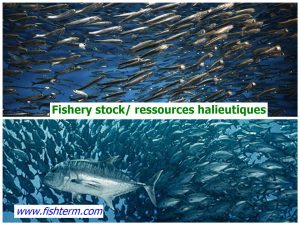
Excerpt showing a usage example of fishery in the context of fish stock:
… The United Nations Fish Stocks Agreement (in force since 2001) should be used as the legal basis for management measures of the high seas fisheries… (FAO’s THE STATE OF WORLD FISHERIES AND AQUACULTURE 2020, page 54)
———————————————————————————————-
… FAO facilitated negotiation of the Code to be consistent with existing instruments and, in a non-mandatory manner, establish principles and standards applicable to the conservation, management and development of all fisheries… (FAO’s THE STATE OF WORLD FISHERIES AND AQUACULTURE 2020, page 93)
3. Fishery: activity/sector/field
This is a field or sector, often classified under agriculture that deals with the culture, harvest, and or processing of edible living aquatic resources. This sector may be governed by a state ministry or ministerial department in charge of fisheries activities. This sector encompasses stakeholders like fishers, aquaculturists, fishmongers, etc, and varies according to region. In Cameroon for instance, the country’s fishery sector is governed by its Ministry of Livestock, fisheries and animal industries (MINEPIA). In the UK, the fishery sector is governed by the Ministry of Agriculture, Fisheries and Food (MAFF).
The fisheries sector may be further broken down into capture fishery and culture fisheries; freshwater and marine fishery; and extensive, semi-industrial, and industrial fishery sectors.
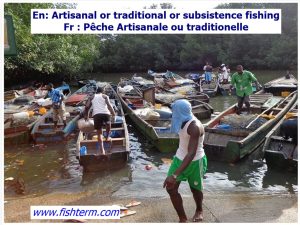
Excerpt showing a usage example of fisheries in the context of a sector:
Asia continues to grow in terms of employment in the sector, albeit at a more measured pace with its large absolute number of people employed in the primary sector of aquaculture and fisheries. (FAO’s THE STATE OF WORLD FISHERIES AND AQUACULTURE 2020, page 39)
4. Fishery: a company or fish industry
Another meaning of Fishery is an enterprise or business that farms, catches, processes, or sells fish or fishery products.
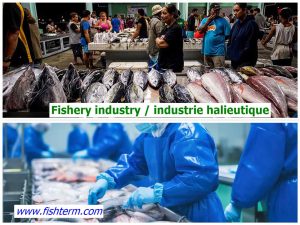
Excerpt showing a usage example of fishery in the context of a company:
Globally, the proportion of women in the total work force in aquaculture (19 percent) is larger than that in fisheries (12 percent) (Figure 14). Overall, women play a crucial role throughout the fish value chain, providing labour in both commercial and artisanal fisheries. (FAO’s THE STATE OF WORLD FISHERIES AND AQUACULTURE 2020, page 39)
… The most common conflicts reported within the coastal area regard fishing gear conflicts and conflicts between coastal and industrial fisheries. (FAO’s THE STATE OF WORLD FISHERIES AND AQUACULTURE 2020, page 97)
5. Fishery: place dedicated to fishery activities
Most governments take into consideration fisheries activities in their regional development and planning policies. During town planning, some areas are earmarked for agriculture and industries. This is the case of industrial zones in towns, which are located on the outskirts of the town. When an area has been earmarked for fisheries activities, it is referred to as a fishery. Most towns already have fisheries (fishing grounds) where fishery activities could be practiced. It may be called a fishing ground.

A fishing village or town is a village or town, usually located near a fishing ground, with an economy based on catching fish and harvesting seafood. Some of these villages include:
- Amed, in Indonesia
- Bethsaida, in Israel
- Akwidaa, in Ghana
- Chibu, in Japan
- Huanchaco, in Peru
- Kakapir, in Pakistan
- Marsaxlokk, in Malta, etc.
This is a list of fishing villages across the world.
6. Fishery: licence to operate in the fishery sector
A fishery licence, also known as a fishery permit is an authorisation issued to fisheries stakeholders as an administrative or legal mechanism employed by local governments to regulate fishery activities.

Read more on licences.
7. Fishery: An area in a waterway rich in fishery resource
Resources don’t usually evenly distribute themselves along a natural waterway. They are often noticed, for some reason, to have accumulated in specific regions along the waterway. These resource-rich areas are known as fisheries. Fisheries are usually marked by heavy catches.
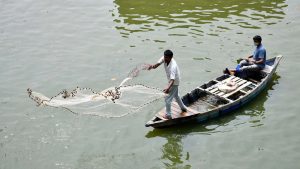
Differences between ‘Fishing, Fishery and Fisheries’
The words Fishing, Fishery and Fisheries originated at different times in history. In the past ‘Fisheries’ was used as the plural of ‘Fishery’ and there was no ambiguity when using both terms until neologism set in with the advent of technology and new scientific procedures. Today, these terms have become so polysemous that it results in a lot of ambiguity if the writer does not draft clearly.
As regards differences between Fishing, Fishery and Fisheries, most authors admit that:
- Fishery is the singular of Fisheries. e.g. a fishery, many oyster fisheries.
- Fishery is subdivided into culture fishery and capture fisheries (fishing), which means fishing is a sub-sector of fishery
- Fishery is mostly used as an adjective, while fisheries most often stands alone as a noun. E.g. a fishery plant; investing in fisheries.
Today, ‘fishery’ is used interchangeably with ‘fisheries’ when referring to the sector, by most prominent authors in the field, like the FAO. In this brief, we are going to be using the singular form, fishery, for consistency, simplicity, and better understanding. We will only use fisheries when referring to the plural of the same concept. For more differences between both terms, read this post.
Disambiguating close synonyms in fisheries: Role of International Fisheries conventions
It is said that words derive their meanings in context; however, it becomes a hard bone to chew when deciding on the right word to choose from a variety of very close synonyms. Specialised and technical terminology is generally marked by precision, clarity and rigour in the use of jargon to avoid ambiguity or misinterpretation. Nonetheless, there seldom are some rare cases where terms may have very close meanings, resulting in them being used interchangeably by students and even by some experts – the fisheries sector, just like many technical sectors, is not spared. In the fisheries sector, this jargon ambiguity exists. At times, persistent controversies amongst fisheries experts may require a convention (often international) to disambiguate confusing synonyms. In the fisheries sector, due to its multi-sectorial nature, many regional commissions have been established across the world to manage fisheries affairs specific to the respective regions and sub-regions under their jurisdiction.
Recommendations when using the terms ‘fishery’ and ‘fisheries’ to avoid ambiguity
When referring to the activity or field, both terms are generally considered to mean the same thing. One is simply preferred over the other in every region.
- Always avoid using the term ‘fishery/fisheries’ repeatedly in a single sentence with each occurrence referring to a different concept. This will spare you from getting into the ambiguity we experienced in our study excerpt above.
- Try to be as clear as possible when writing: It will make no sense to use fishery ambiguously in your sentences if your readers won’t be able to understand you. This means your message won’t get across to your target audience as intended.
- Consult your audience population’s word choice before writing. You may know this by reading fisheries publications from that region or by acquainting with their regional fisheries commission terminology.
- Use fishery/fisheries as an adjective: To avoid ambiguity when using the term ‘fishery/fisheries’, use fishery/fisheries as an adjective and introduce another word. For instance, instead of saying, ‘I own a fishery’, preferably say, ‘I own a fishery industry/business.’ Instead of ‘issuing a fishery’, use ‘issue a fishery licence’.
Below is a simplified table that will enable you to master the differences between the terms :
Table: Differences between fishing, fishery, and fisheries in context examples
|
Concept No. |
Context/meaning |
Appropriate term |
Plural |
|
| 1 | The activity of catching aquatic organisms ( especially fish or shellfish) | Fishing | Fishing (uncountable) | |
| 2 | A part of the ocean sea or river where fish and other aquatic organisms (especially fish and shellfish) are farmed or caught. | Fishery
E.g. A coastal fishery. There is a fishery by the coast of the ocean to catch bigger salmons. |
Fisheries
E.g. coastal fisheries |
|
| 3 | Occupation, enterprise or business that farms, catches, processes or sells fish or fishery products | Fishery/Fisheries
E.g. Small industrial fishery. Creating a fishery here will require a mastery of the present fish market in this district. |
Fisheries
E.g. Small industrial fisheries. – The government announced support for embryonic industrial fisheries. – I am planning to invest in fisheries this year. |
|
| 4 | a place where fish or shellfish are bred | Fishery
E.g. We will use this area as our home fishery to culture fish for our aquarium for the moment. |
Fisheries
e.g. there are a few fisheries on the outskirts of the town where you can see live catfish fingerlings |
|
| 5 | (Law) . The right to fish in certain waters or at certain times. This is an authorisation issued by the governing body of a country to fisheries stakeholders intending to carry out fishery activities | Fishery
e.g. The state issued him a fishery to enable them to continue fishing around the estuary until June. |
Fisheries
e.g. Oyster fisheries are required to renew their expired fisheries before December. |
|
| 6 | The academic discipline of managing and understanding fisheries. | Fishery/Fisheries ( fisheries science) | fisheries sciences | |
Leave a Reply